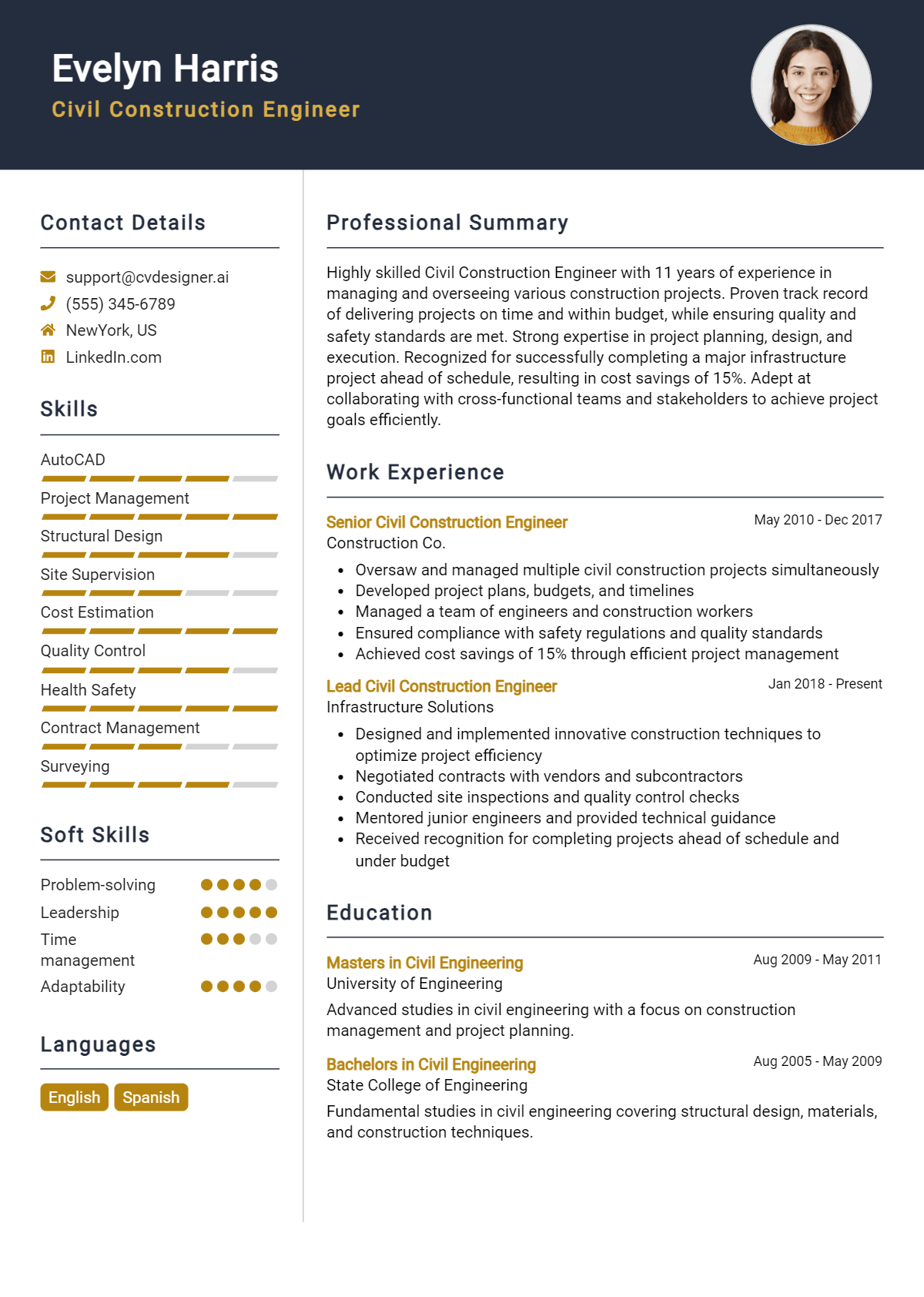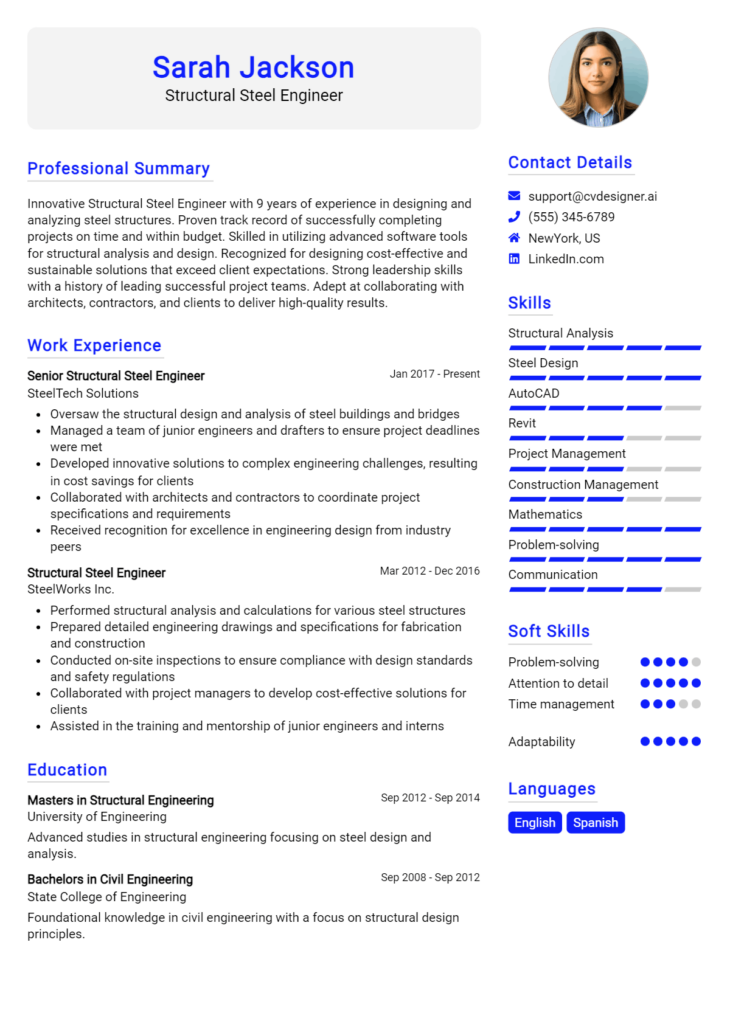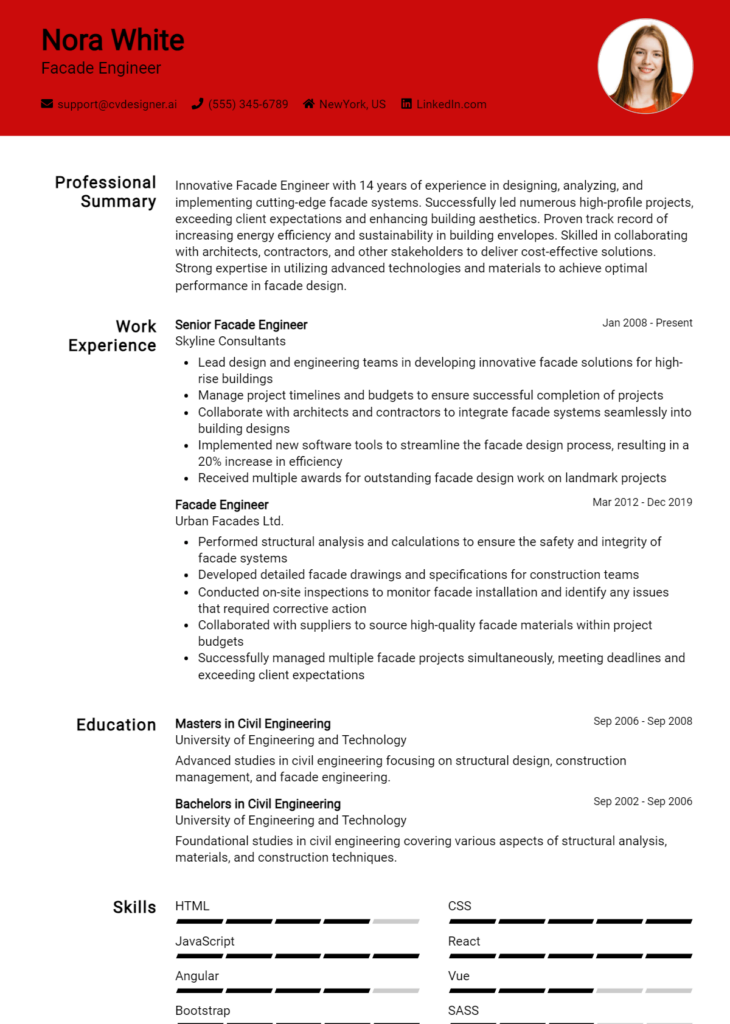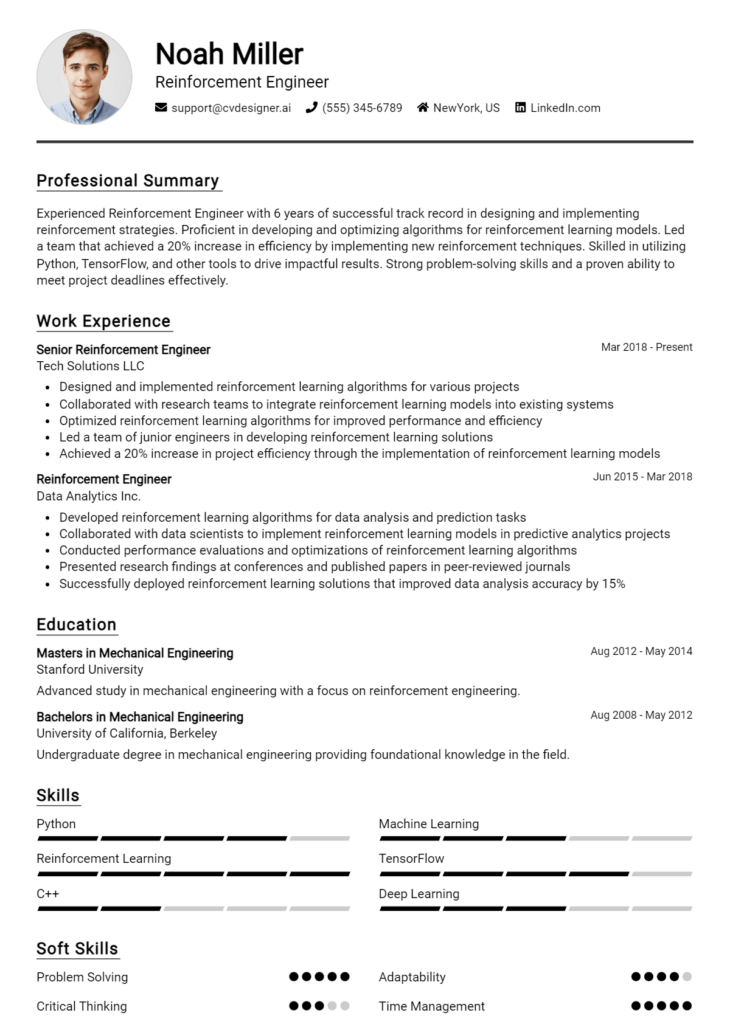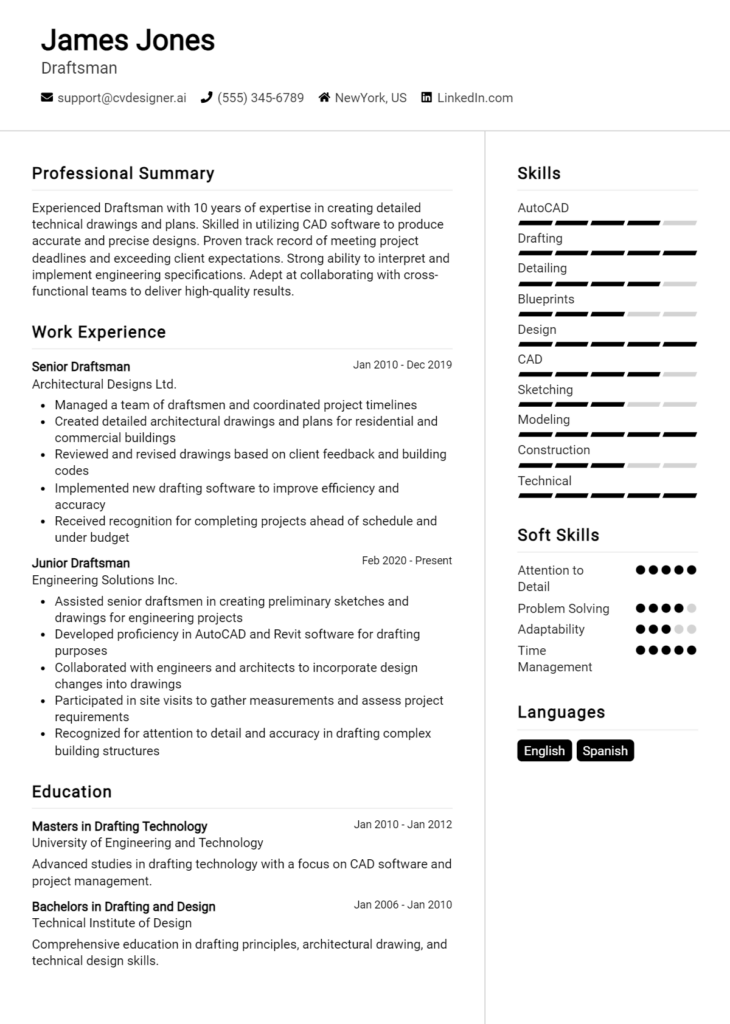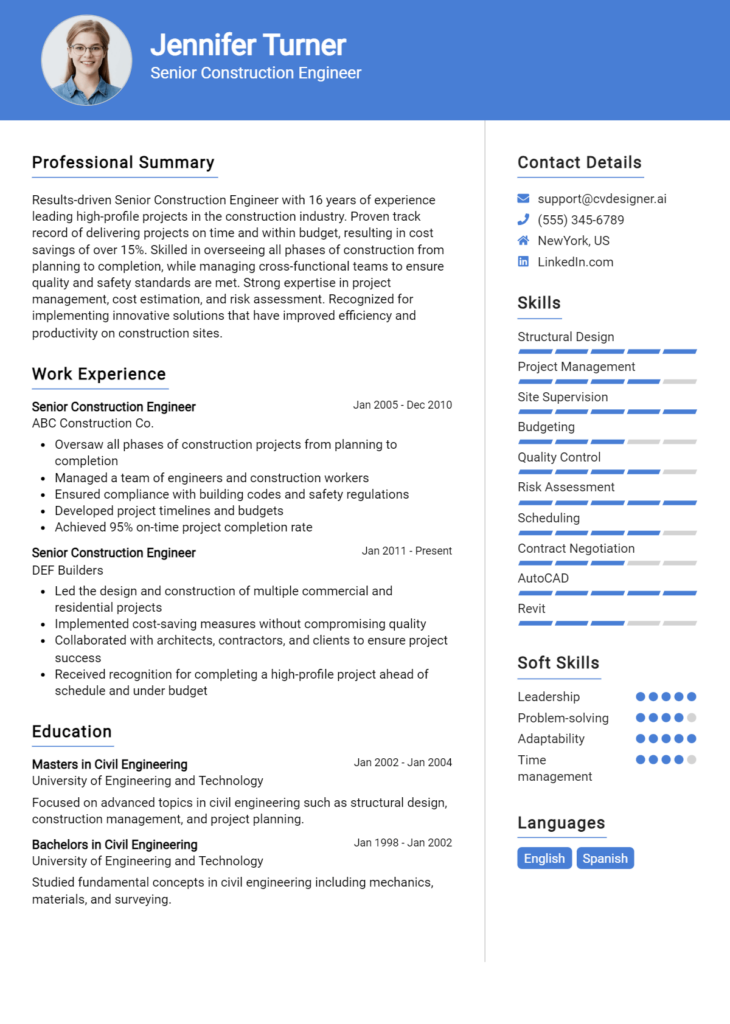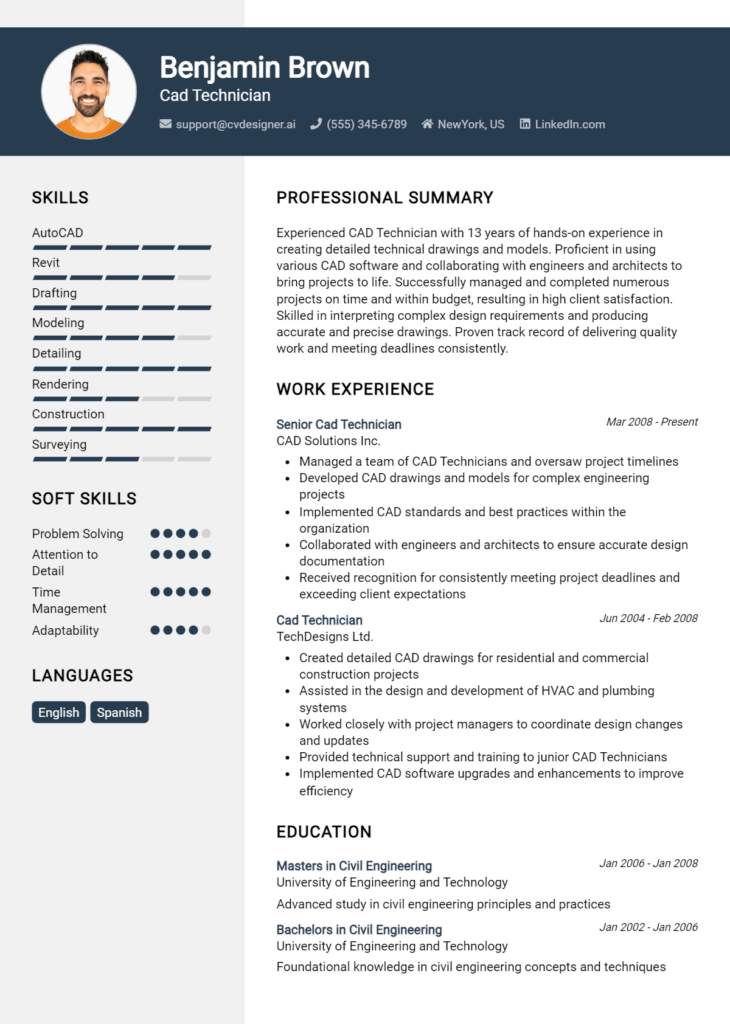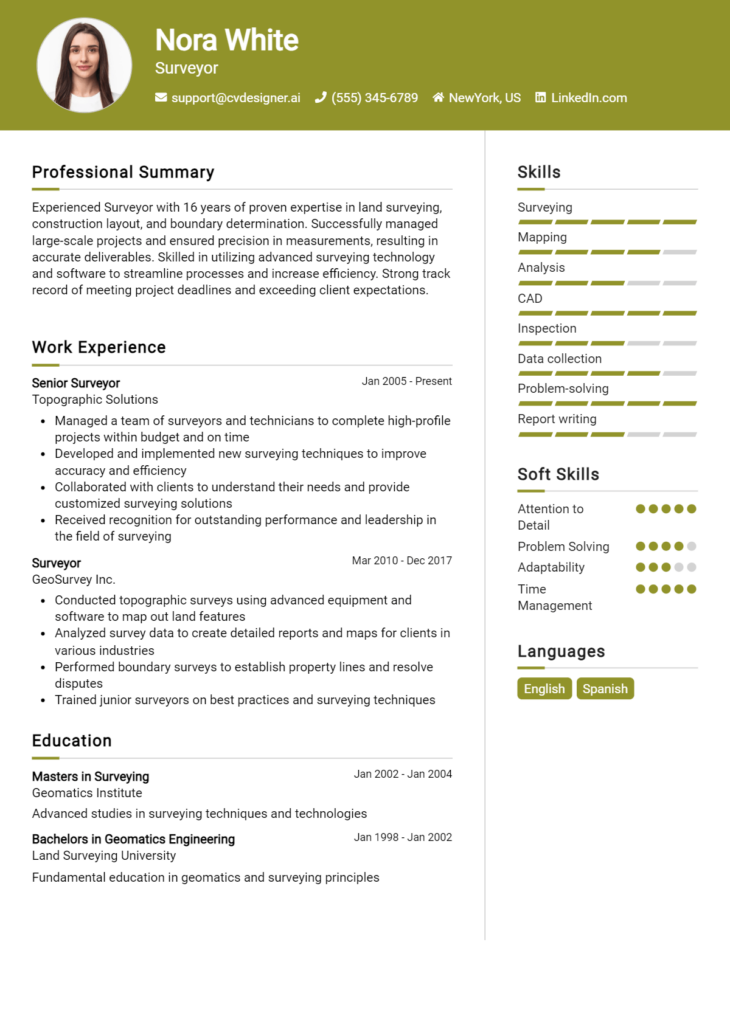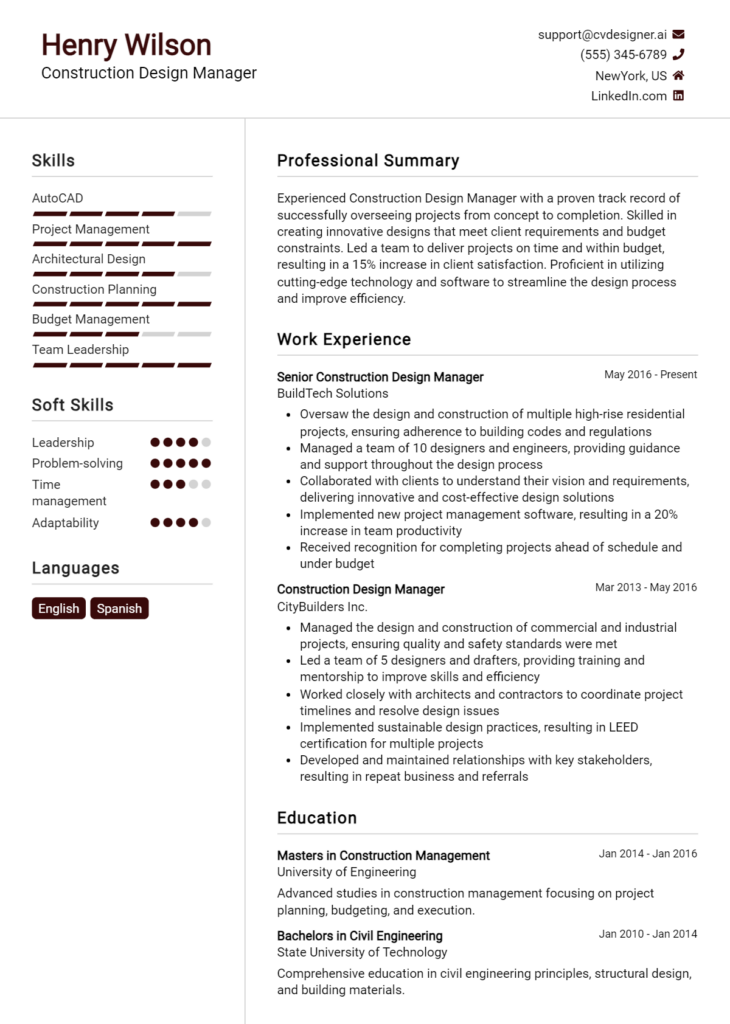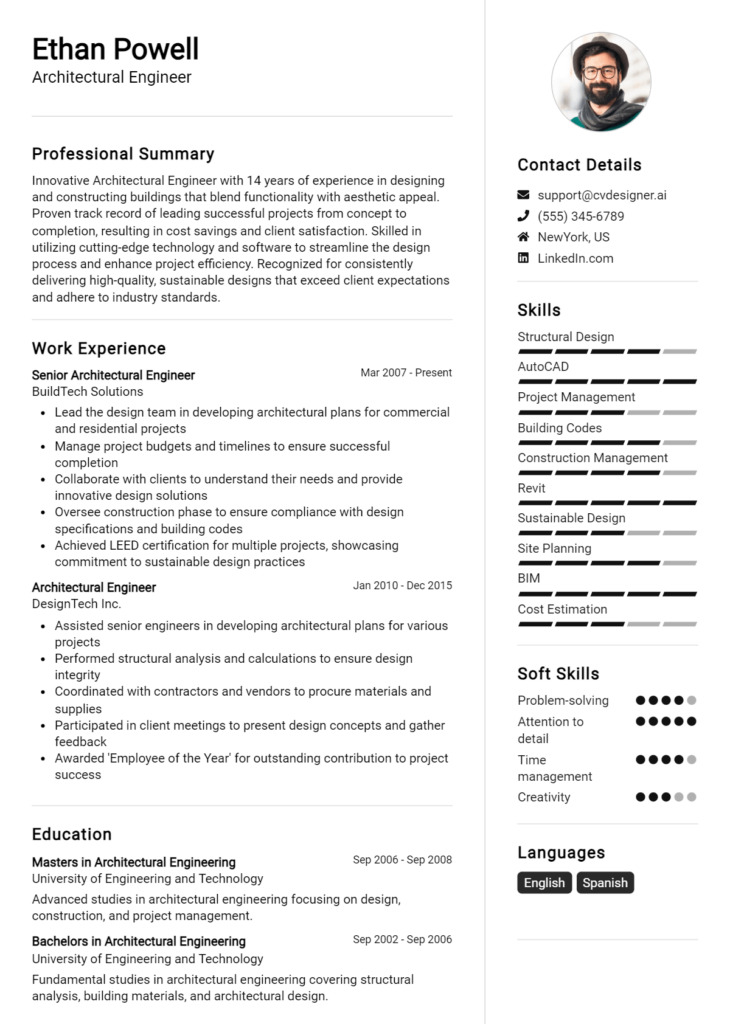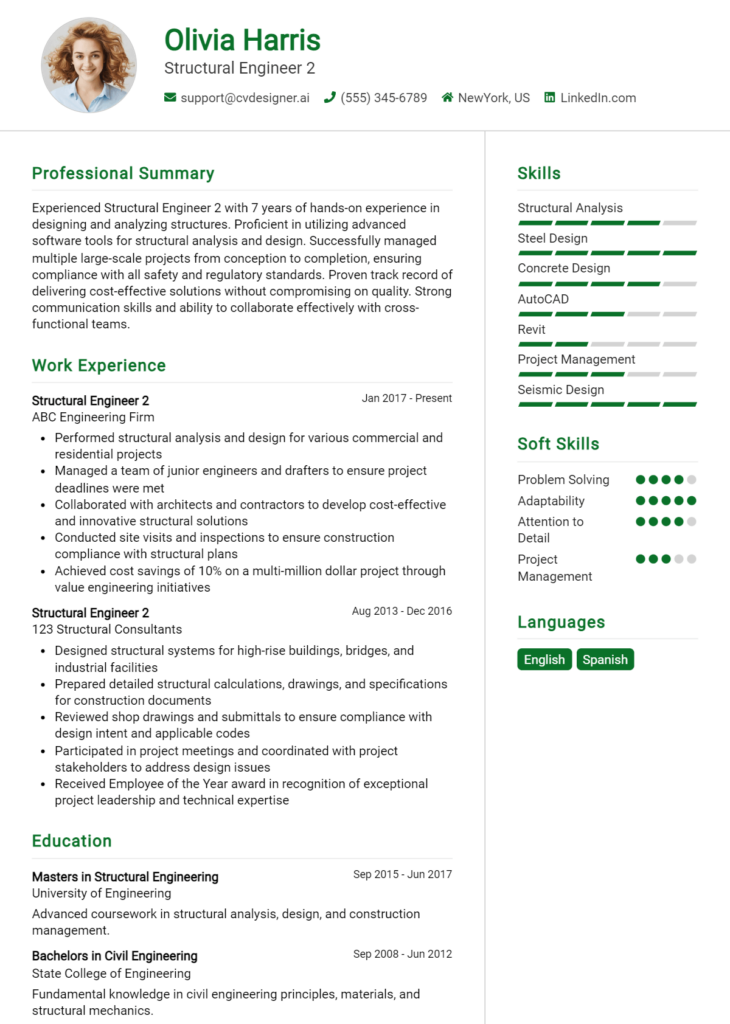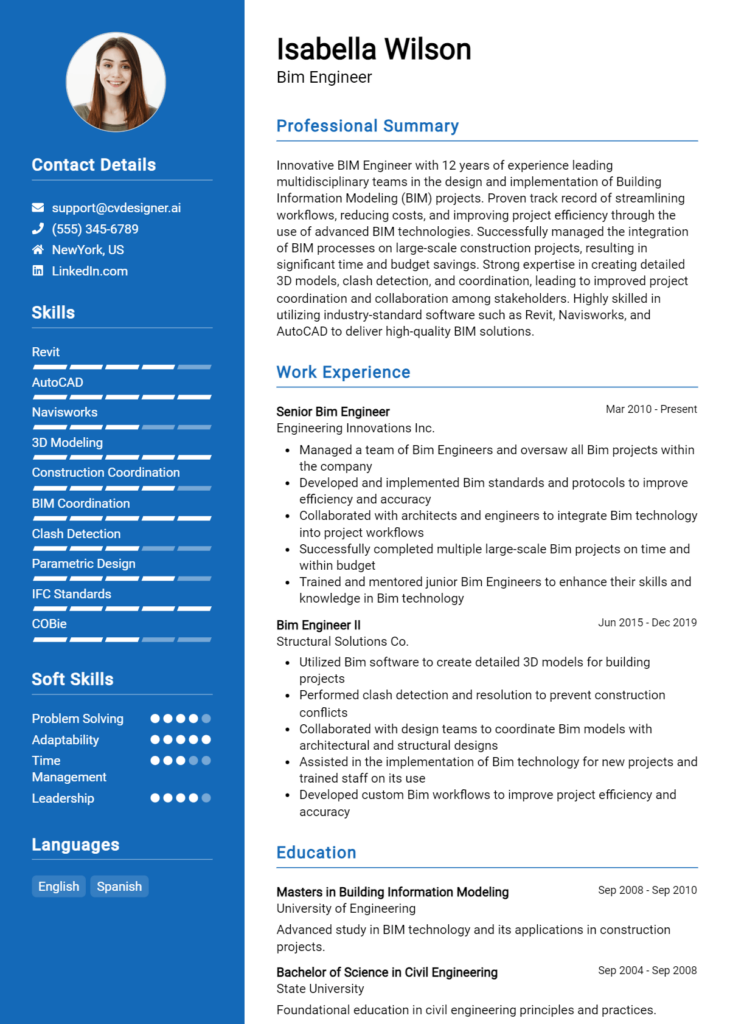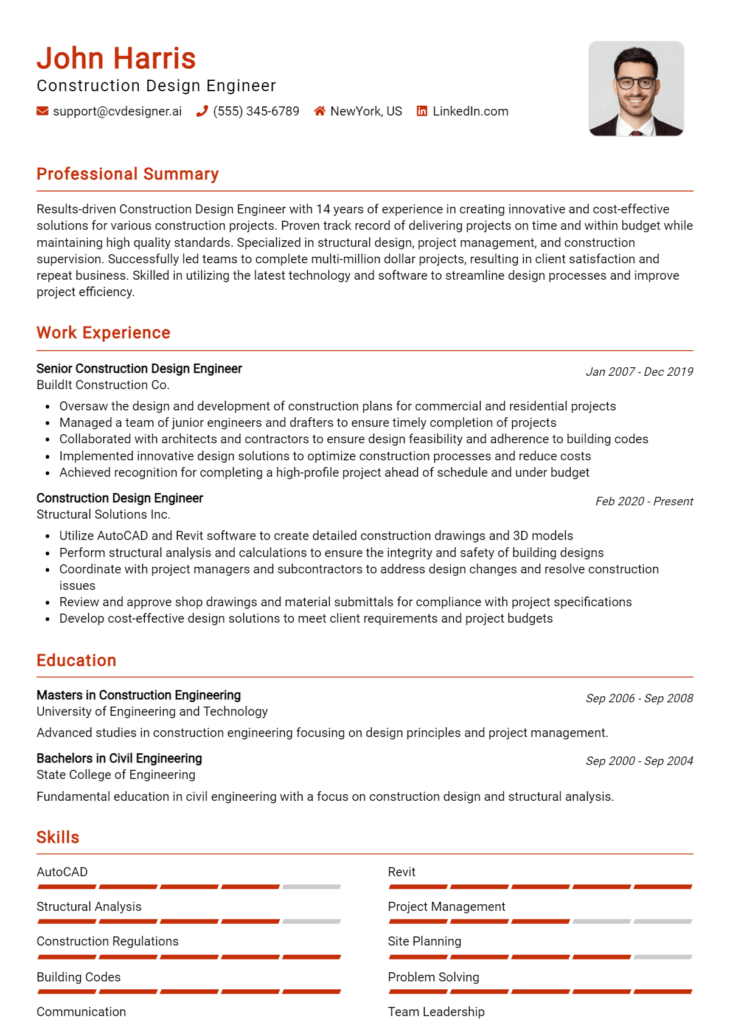Civil Construction Engineer Core Responsibilities
A Civil Construction Engineer plays a pivotal role in overseeing infrastructure projects, requiring a blend of technical and operational skills. Key responsibilities include project planning, design review, and quality assurance, which necessitate strong problem-solving abilities and collaboration across various departments, such as architecture and environmental science. These skills are crucial for meeting organizational goals, ensuring project efficiency, and maintaining safety standards. A well-structured resume effectively highlights these qualifications, showcasing the engineer's expertise and contributions to successful project outcomes.
Common Responsibilities Listed on Civil Construction Engineer Resume
- Conduct site assessments and feasibility studies.
- Develop and review project designs and plans.
- Manage construction schedules and budgets.
- Ensure compliance with safety regulations and quality standards.
- Collaborate with architects, contractors, and stakeholders.
- Monitor project progress and resolve issues promptly.
- Prepare technical reports and documentation.
- Oversee material selection and procurement processes.
- Implement sustainable construction practices.
- Utilize engineering software for design and analysis.
- Provide technical guidance and support to construction teams.
- Conduct inspections and assessments of completed projects.
High-Level Resume Tips for Civil Construction Engineer Professionals
In the competitive field of civil construction engineering, a well-crafted resume serves as a vital tool that can significantly influence a candidate's job search success. This document often represents the first impression a potential employer has of a candidate, making it essential for it to effectively showcase both skills and achievements. A strong resume not only highlights relevant experience but also reflects the unique qualifications that set one candidate apart from another. In this guide, we will provide practical and actionable resume tips specifically tailored for civil construction engineer professionals, ensuring that your resume stands out in a crowded job market.
Top Resume Tips for Civil Construction Engineer Professionals
- Tailor your resume to each job application by incorporating keywords from the job description.
- Highlight relevant engineering experience, focusing on projects that align with the desired role.
- Quantify your achievements with specific metrics, such as cost savings, time reductions, or project sizes.
- Showcase industry-specific skills, such as proficiency in structural analysis software or knowledge of building codes.
- Include certifications and licenses, such as Professional Engineer (PE) status, to enhance credibility.
- Utilize a clean and professional format that enhances readability and draws attention to key sections.
- Incorporate a summary statement that succinctly captures your qualifications and career goals.
- List relevant professional affiliations, such as membership in the American Society of Civil Engineers (ASCE).
- Provide context for your roles by briefly describing the scope and impact of projects you have worked on.
- Keep your resume to one or two pages, ensuring that every piece of information adds value and relevance.
By implementing these tips, civil construction engineer professionals can significantly boost their chances of landing a job in their field. A well-structured and targeted resume not only showcases your qualifications and experience but also demonstrates your attention to detail and commitment to excellence—qualities that are highly valued in the engineering industry.
Why Resume Headlines & Titles are Important for Civil Construction Engineer
In the competitive field of civil construction engineering, a well-crafted resume headline or title holds significant importance. It serves as the first impression for hiring managers, quickly summarizing a candidate's key qualifications and expertise in a single impactful phrase. A strong headline can captivate attention, setting the tone for the rest of the resume, and allowing the candidate to present themselves as a strong fit for the role. By being concise, relevant, and directly aligned with the job being applied for, a resume headline can effectively convey a candidate's strengths and help them stand out in a crowded applicant pool.
Best Practices for Crafting Resume Headlines for Civil Construction Engineer
- Keep it concise: Aim for one impactful phrase, ideally under 10 words.
- Be specific: Use terminology relevant to the civil construction field.
- Highlight key qualifications: Focus on certifications, skills, or experiences that align with the job description.
- Include measurable achievements: If possible, quantify accomplishments to add credibility.
- Tailor for each application: Adjust the headline to match the specific job requirements.
- Use action-oriented language: Start with strong action verbs to convey confidence.
- Stay professional: Avoid using casual language or unnecessary jargon.
- Reflect your career stage: Ensure the headline matches your level of experience, whether entry-level or senior.
Example Resume Headlines for Civil Construction Engineer
Strong Resume Headlines
"Experienced Civil Construction Engineer Specializing in Project Management"
“Licensed Civil Engineer with 10+ Years in Infrastructure Development”
“Results-Driven Engineer with Proven Track Record in Cost Reduction and Efficiency”
Weak Resume Headlines
“Civil Engineer Looking for Work”
“Hardworking Professional”
The strong headlines are effective because they are specific and immediately communicate the candidate's qualifications and achievements, providing clear value to potential employers. In contrast, the weak headlines fail to impress due to their vagueness and lack of relevant detail, making it difficult for hiring managers to gauge the candidate's fit for the role or the unique skills they bring to the table.
Writing an Exceptional Civil Construction Engineer Resume Summary
A well-crafted resume summary is essential for a Civil Construction Engineer, as it serves as the first impression that hiring managers receive. A strong summary quickly captures attention by showcasing key skills, relevant experience, and notable accomplishments that align with the job role. It should be concise and impactful, offering a snapshot of the candidate's qualifications that motivates the reader to delve deeper into the resume. Tailoring the summary to the specific job being applied for enhances its effectiveness, making it clear to potential employers why the candidate is the ideal fit for their team.
Best Practices for Writing a Civil Construction Engineer Resume Summary
- Quantify Achievements: Use numbers to demonstrate the impact of your work, such as projects completed on time or under budget.
- Focus on Key Skills: Highlight specific skills that are relevant to the job, such as project management, structural analysis, or knowledge of building codes.
- Tailor for the Job Description: Customize your summary to align with the requirements and responsibilities listed in the job posting.
- Use Action Words: Start with strong action verbs to convey your accomplishments and contributions effectively.
- Keep it Concise: Aim for 2-4 sentences that clearly communicate your value without overwhelming the reader.
- Showcase Relevant Experience: Mention specific projects or roles that demonstrate your expertise in civil construction.
- Incorporate Industry Keywords: Use terminology that reflects your understanding of the civil construction field and aligns with the company’s values.
- Highlight Certifications: If applicable, mention relevant certifications or licenses that enhance your credibility as a civil construction engineer.
Example Civil Construction Engineer Resume Summaries
Strong Resume Summaries
Results-driven Civil Construction Engineer with over 8 years of experience in managing multimillion-dollar projects, achieving a 20% reduction in construction time through innovative project management strategies.
Detail-oriented Civil Engineer skilled in structural design and site development, successfully completed 15+ residential and commercial projects on budget and ahead of schedule, with a focus on sustainability and compliance with local regulations.
Licensed Civil Construction Engineer with a proven track record of improving project efficiency by 25%, leveraging expertise in CAD software and strong communication skills to lead cross-functional teams in delivering high-quality infrastructure solutions.
Weak Resume Summaries
Civil Construction Engineer with experience in various projects and a general understanding of the field.
Motivated engineer looking for a challenging role in civil construction where I can apply my skills and knowledge.
The examples of strong resume summaries stand out because they are specific and quantify the candidate’s achievements, showcasing their direct relevance to the role of a Civil Construction Engineer. In contrast, the weak summaries lack detail and measurable outcomes, making them too vague and generic to effectively capture a hiring manager's interest. Strong summaries provide a clear picture of the candidate’s value, while weak summaries fail to differentiate the applicant from others in the field.
Work Experience Section for Civil Construction Engineer Resume
The work experience section of a Civil Construction Engineer resume is critical for demonstrating a candidate's technical skills and ability to lead teams effectively in delivering high-quality projects. This section is where candidates can highlight their practical experience, showcasing their proficiency in various engineering disciplines, project management, and adherence to safety and quality standards. By quantifying achievements—such as the completion of projects under budget or ahead of schedule—and aligning their experiences with industry benchmarks, candidates can effectively position themselves as valuable assets in the construction field.
Best Practices for Civil Construction Engineer Work Experience
- Highlight specific technical skills relevant to civil engineering, such as proficiency in CAD software or knowledge of construction materials.
- Quantify results with metrics, such as the percentage of cost savings achieved on projects or the number of successful projects completed.
- Detail leadership experiences, including the size of teams managed and the scope of projects directed.
- Incorporate industry-standard terminology to demonstrate familiarity with regulatory and compliance requirements.
- Focus on collaboration by describing teamwork experiences and the ability to work across different disciplines.
- Prioritize recent experiences that align with the desired role to keep the resume relevant and impactful.
- Utilize action verbs to convey a sense of initiative and impact, such as "managed," "designed," or "implemented."
- Tailor the work experience section to reflect the job description of the position being applied for, ensuring alignment with employer expectations.
Example Work Experiences for Civil Construction Engineer
Strong Experiences
- Managed a team of 10 engineers in the design and execution of a $5 million highway project, completing it 15% under budget and two months ahead of schedule.
- Developed and implemented a quality control plan that reduced site rework by 30%, enhancing project efficiency and client satisfaction.
- Collaborated with environmental consultants to ensure sustainable practices were integrated into all phases of a multi-million dollar urban development project, resulting in a 25% reduction in carbon footprint.
- Led the successful integration of advanced BIM technology into project planning, which improved visualization and project coordination, reducing conflicts by 40% during construction.
Weak Experiences
- Worked on various construction projects, contributing to team efforts.
- Assisted in project management tasks and followed directives from senior engineers.
- Participated in meetings and discussed project progress with stakeholders.
- Helped maintain safety protocols on job sites without specific details on outcomes.
The examples of strong experiences are marked by specific, quantifiable outcomes that demonstrate the candidate's technical leadership and ability to collaborate effectively, showcasing a direct impact on project success. In contrast, the weak experiences lack detail and measurable results, making them less compelling and failing to convey the candidate's true capabilities and contributions in the civil construction field.
Education and Certifications Section for Civil Construction Engineer Resume
The education and certifications section of a Civil Construction Engineer resume is crucial as it establishes the candidate's academic foundation and demonstrates their commitment to professional development. This section not only showcases relevant degrees but also highlights industry-recognized certifications and specialized training that can set candidates apart in a competitive job market. By providing details on relevant coursework and certifications, applicants enhance their credibility and illustrate their alignment with the specific requirements of the civil engineering role, showcasing their dedication to continuous learning and adherence to industry standards.
Best Practices for Civil Construction Engineer Education and Certifications
- Prioritize relevant degrees in civil engineering or related fields, ensuring they are prominently displayed.
- Include industry-recognized certifications such as Professional Engineer (PE) or Project Management Professional (PMP).
- List specialized training programs or workshops that are pertinent to the civil construction field.
- Focus on coursework that directly ties to the job role, such as structural analysis, construction materials, and project management.
- Use clear and concise formatting to enhance readability, making it easy for hiring managers to find key information.
- Keep the section updated by removing outdated qualifications and adding new certifications or completed courses.
- Highlight any honors or awards received during academic pursuits to further bolster credibility.
- Consider including relevant continuing education units (CEUs) to demonstrate ongoing professional development.
Example Education and Certifications for Civil Construction Engineer
Strong Examples
- Bachelor of Science in Civil Engineering, University of ABC, Graduated May 2020
- Professional Engineer (PE) License, State Board of Professional Engineers, Issued June 2021
- Certificate in Construction Management, Online Program at XYZ University, Completed August 2022
- Relevant Coursework: Structural Analysis, Geotechnical Engineering, Environmental Engineering
Weak Examples
- Bachelor of Arts in History, University of XYZ, Graduated May 2018
- Certification in Basic First Aid, Completed January 2020
- Online Course in Graphic Design, Completed March 2021
- High School Diploma, Graduated 2016
The strong examples are considered effective because they directly align with the qualifications and skills necessary for a Civil Construction Engineer, showcasing relevant degrees and certifications that enhance the candidate's professional profile. In contrast, the weak examples lack relevance to the civil engineering field, featuring qualifications that do not contribute to the candidate's expertise or credibility in this specific role, thus failing to demonstrate the necessary background and commitment to the industry.
Top Skills & Keywords for Civil Construction Engineer Resume
In the competitive field of civil construction engineering, having the right skills is critical to making a strong impression on potential employers. A well-crafted resume not only highlights your technical knowledge and experience but also showcases the soft skills that demonstrate your ability to collaborate and communicate effectively. By strategically incorporating relevant skills into your resume, you can present yourself as a well-rounded candidate who is equipped to tackle the challenges of modern construction projects.
Top Hard & Soft Skills for Civil Construction Engineer
Hard Skills
- AutoCAD and other drafting software
- Structural analysis and design
- Project management software (e.g., Primavera, MS Project)
- Knowledge of building codes and regulations
- Site surveying and mapping
- Geotechnical engineering principles
- Materials science and selection
- Cost estimation and budgeting
- Construction methods and techniques
- Environmental impact assessments
- Quality assurance and control processes
- Civil engineering principles
- Safety management practices
- Contract management
- Hydraulic and fluid mechanics
- Sustainable design practices
- BIM (Building Information Modeling) proficiency
Soft Skills
- Strong communication skills
- Team collaboration and leadership
- Problem-solving abilities
- Attention to detail
- Time management and organizational skills
- Adaptability to changing environments
- Critical thinking
- Conflict resolution
- Negotiation skills
- Creativity and innovation
- Analytical skills
- Decision-making capabilities
- Client relationship management
- Interpersonal skills
- Cultural awareness and sensitivity
- Stress management
- Initiative and self-motivation
When crafting your resume, remember to emphasize both your hard and soft skills, as they are essential elements that potential employers look for. Additionally, including relevant work experience will further bolster your qualifications and help you stand out in the job market.
Stand Out with a Winning Civil Construction Engineer Cover Letter
I am writing to express my interest in the Civil Construction Engineer position at [Company Name], as advertised on [Job Board/Company Website]. With a Bachelor’s degree in Civil Engineering and over [X years] of experience in the construction industry, I have developed a robust skill set that includes project management, structural analysis, and site supervision. My hands-on experience in overseeing large-scale projects has equipped me with the ability to tackle complex challenges while ensuring compliance with safety regulations and quality standards.
In my previous role at [Previous Company Name], I successfully led a team of engineers and construction workers in the execution of a [specific project, e.g., highway expansion, bridge construction]. I was responsible for coordinating all aspects of the project, from initial design and planning phases through to completion. My ability to communicate effectively with stakeholders, including contractors, architects, and clients, allowed us to complete the project ahead of schedule and under budget. This experience honed my skills in problem-solving and critical thinking, which I believe are essential attributes for a Civil Construction Engineer.
Beyond my technical abilities, I pride myself on my commitment to sustainability and innovation in construction practices. I have actively sought out opportunities to implement environmentally friendly materials and methods in my projects, and I continuously strive to enhance efficiency and reduce waste. I am excited about the potential to bring these values to [Company Name] and contribute to your mission of delivering exceptional civil engineering solutions.
I am looking forward to the opportunity to discuss how my background, skills, and enthusiasms align with the goals of [Company Name]. Thank you for considering my application. I hope to bring my expertise in civil construction engineering to your esteemed company and help drive future projects to success.
Common Mistakes to Avoid in a Civil Construction Engineer Resume
When crafting a resume for a Civil Construction Engineer position, it’s essential to present a professional and polished document that highlights your qualifications and experiences effectively. Many candidates make common mistakes that can detract from their chances of landing an interview. Recognizing and avoiding these pitfalls can significantly improve your resume and enhance your appeal to potential employers. Here are some common mistakes to watch out for:
Vague Job Descriptions: Failing to provide specific details about your responsibilities and achievements can make your experience seem less impactful. Use quantifiable metrics and clear examples to showcase your contributions.
Ignoring Keywords: Many companies use Applicant Tracking Systems (ATS) to filter resumes. Not including relevant industry keywords can prevent your resume from being seen by hiring managers.
Inconsistent Formatting: A cluttered or inconsistent format can be distracting and unprofessional. Use a clean, uniform layout with consistent fonts, sizes, and spacing to create a polished look.
Overloading with Technical Jargon: While technical skills are crucial, overloading your resume with jargon can alienate non-technical hiring managers. Balance technical language with clear explanations of your skills.
Neglecting Soft Skills: Focusing solely on technical abilities neglects important soft skills like communication, teamwork, and problem-solving, which are critical in construction projects. Highlight these skills to present a well-rounded profile.
Lack of Tailoring: Sending out a generic resume can signal a lack of interest in a specific role. Tailor your resume for each application by emphasizing relevant experience and skills that align with the job description.
Omitting Important Certifications: Certifications in project management, safety, or specific construction methodologies can set you apart. Ensure you list all relevant certifications clearly and prominently.
Not Proofreading: Spelling and grammatical errors can undermine your professionalism. Take the time to proofread your resume or have someone else review it to catch any mistakes before submission.
Conclusion
As a Civil Construction Engineer, you play a critical role in designing, planning, and overseeing construction projects that shape the infrastructure of our communities. This article has explored the essential skills and qualifications required for this dynamic job role, including technical expertise, project management skills, and the ability to work collaboratively with diverse teams.
Additionally, we discussed the importance of staying updated with industry standards and regulations, as well as the necessity for effective communication and problem-solving skills to navigate challenges that arise on-site.
In conclusion, if you aspire to excel in your career as a Civil Construction Engineer, it’s essential to present your qualifications and experiences effectively on your resume. Take a moment to review your resume and ensure it highlights your most relevant skills and accomplishments.
To assist you in this process, consider utilizing the following resources:
- Explore a variety of resume templates to find a design that suits your style and profession.
- Create your tailored resume easily with our resume builder.
- Gain inspiration from our curated resume examples that showcase successful Civil Construction Engineers.
- Don’t forget to craft a compelling cover letter using our cover letter templates to make a lasting impression on potential employers.
Take action today—revamp your resume and stand out in your field!

